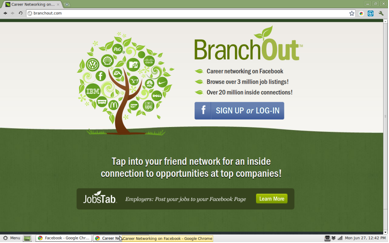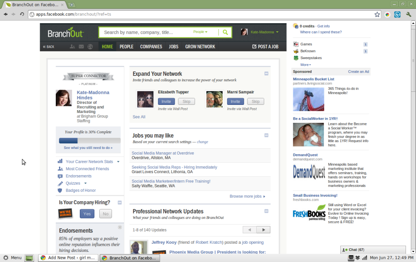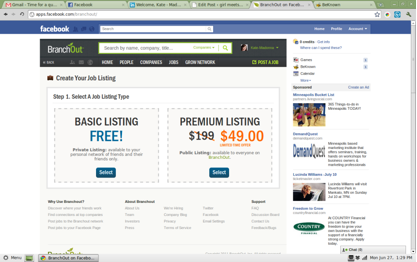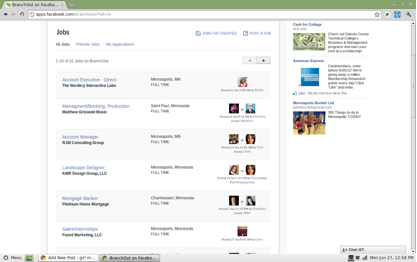Facebook has been a forerunner in personal networking. As more companies have joined Facebook, the applications utilizing personal and professional information are also on the rise. Two years ago we saw this same process within Twitter as more and more developers saw a way to profit and join the network. However, an important question is being asked: Is Facebook trying to be too much to too many people?
I’ve seen the fads come and go (Farmville, Mafia Wars, Questions). The latest additions to Facebook are professional networking platforms. BranchOut and BeKnown are the first two I’ve tried. I’ve noticed it’s a battle to leave my Facebook Wall uncluttered. Head to head, which professional application on Facebook is truly the best? This week, I’m looking into BranchOut.
BranchOut

BranchOut boasts hidden job opportunities with top companies and over 20 million connections…
First and foremost, BranchOut has some powerful statements about their application and they want you to know their roots, backing, and intention. On their About Page they boast, “BranchOut was founded in July 2010 by CEO Rick Marini and a team with deep experience in social media, online recruiting, and Facebook applications. BranchOut is backed by some of the best investors and advisors in the world.”
ReadWriteWeb cited BranchOut as a break-out hit. BranchOut certainly has the backing, but does their application incorporate three important standards in development?
- Ease of Use: Even social media enthusiasts are now lazy. We want our programs to connect automatically via algorithm and we want it to import our information. What good is a program that has us retype our resume when LinkedIn holds our information? BranchOut understands the Ease Of Use mentality to a ‘T.’ I can either import my profile via LinkedIn or Monster.com and it uploads my already inputted information from the job descriptions and titles I have on my Facebook profile. What troubles me about 3rd party applications is that I have to disable my ‘https‘ connection (secure browsing). With Facebook, the option to browse and use an ‘https‘ connection is a major factor for me. To use BranchOut, I have to disable my security. It’s understandable, as the application is a messenger for back and forth information, however: My security trumps what I need from Facebook. My rule is: If it needs to be unsecure, it is also unsecure and I really evaluate my decision to utilize the platform. In addition, it’s time for Facebook to re-think their ads to the right of everything. Not only are the ads distracting, they offer no real value to me as I scroll. (As a rule, I never click on a Facebook ad. If I find something I like, I’ll go to Google and type in their information. It saves the cost of a click!)
One great thing BranchOut has going for it: Applying is a single click. I applied to a ‘Front End Development’ position at a Minneapolis company. I only had to click once for the recruiter or job poster to know I was interested in the position. The best part? I could get an introduction, (for FREE) and find someone in my network that would alert the poster I was interested, with another single click. A large downside I see is that Google isn’t pulling results for people using BranchOut. I can’t type in someone’s name and instantly know if they are using the application. It seems too personal and one-dimensional to attract the job seekers it intends to. If BranchOut wants to be more successful, it should see about offering a tab on someone’s public profile so a recruiter could automatically click and see that the individual is using the tool.

- Value: Value is subjective. What I may undervalue someone else may not be able to live without. In my case, I have a solid Facebook profile and I use the space given to speak professionally about my business, past opportunities, and who I am as a professional. BranchOut enables me to get ‘endorsements,’ just like LinkedIn offers recommendations. The endorsements I’ve seen on BranchOut tend to be a less professional caliber than LinkedIn, shorter and to the point. Will it offer value if a company ONLY posts on BranchOut for its job? Perhaps. However, I can’t imagine most companies would ONLY use BranchOut to post their available opportunities.
Just like social media itself, I think BranchOut offers a new alternative to LinkedIn, but it seems very one-sided. I’m a little cynical: If Facebook is offering a new application where you can post your company’s open positions or look for jobs, they HAVE to be making money off it (and rightfully so.) There are two ways to look at VALUE on BranchOut. One is from a networking perspective and one is from a business perspective. As a networker, it’s a free tool that basically allows you to place your LinkedIn profile on your Facebook. However, it’s not easy to find. BranchOut doesn’t have its own tab, nor can I just pull up my BranchOut from my own profile. I have to use it as an application. If a hiring manager wants to find me on BranchOut, they might be unsuccessful.
BranchOut has this to say about people searching for your profile. Below is a quote from their “About Us” page:
While unlocking the power of your network, BranchOut creates a safe environment to utilize your network by only showing your name, profile picture, work history, and education. By only using this information, BranchOut eliminates the possibility of employers or recruiters seeing private pictures, posts or other information, thus keeping your private life on Facebook and your professional profile on BranchOut.
In short: Recruiters and hiring managers need to know your name to find you.
Lastly, from a business value perspective the job postings feature seems silly. They will offer me a job posting for free but it will just be visually-available to those in my network. (And those out of my network, can’t receive a forwarded listing as that feature isn’t enabled. If I wanted to post a job, I’d have to decide to pay per job, ($49) or post ONLY to my network for free. The free option is great for small to mid-size businesses with a very low budget for talent acquisition, and the paid feature is low enough that it wouldn’t stir the pot. But how many people are truly using Facebook for their job search?

- Visual Appeal: The truth of any site/application or software is that if it isn’t visually appealing, even good programming may alienate consumers from using the product. Is BranchOut appealing? Absolutely. Because of the functionality within Facebook, it achieves the goal of acting like a website within a website. In fact, it’s self-sufficient and even has its own privacy settings. The downside I see is that it’s housed ONLY in Facebook. While the jobs that came up when I did a search were minimal, it was apparent recruiters were already on top of the technology. For an application designed to help people connect and find jobs – that’s very appealing!

Conclusion and Caution
For those looking to use Facebook as a platform to find jobs, it might be a good tool to become acclimated with while still utilizing other platforms. Since profile and photo are available, (by default to everyone,) when you give the application permission; it’s important to remember to be professional online. For anyone with a profile on ANY networking site, it’s important to remember security and privacy settings. I consider my Facebook profile more intimate than Twitter or LinkedIn and I treat Facebook with care.
For recruiters and hiring managers, BranchOut offers a less-expensive option than other leading Facebook job posting applications. It’s worth checking out. I see BranchOut being another Applicant Tracking System that someone needs to monitor, but a faster process to apply for open positions. Many years ago, we had different search engines for different jobs. I see a flow backwards to creating industry-specific ways for job seekers to apply and creating more work for both posters and job seekers, themselves.
The world is changing and Facebook is no longer the “bar” it once was. By having a solid and professional presence on all networking sites, and by taking advantage of new methods of reaching potential candidates through various platforms, you can expect greater success – both as a job-seeker and as a recruiting professional.
